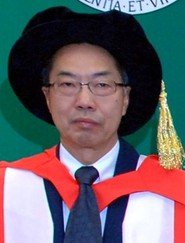

Professor Mak Tak Wah works at the cutting edge of biomedical research seeking an understanding of fundamental topics that are relevant to the prevention and cure of disease. He has dedicated his life to the mechanisms underlying how the body distinguishes its own cells from foreign intruders and how our body cells escape the normal regulatory system to become cancerous. He is a true benefactor of our global society.
Professor Mak was born in Mainland China where his father was a businessman. The Mak family decided to move to Hong Kong in 1949 and he spent his school days at Wah Yan College in Hong Kong. He tells me that during his schooldays he contemplated becoming a priest, but his scientific interests prevailed. He left Asia to pursue his undergraduate studies at the University of Wisconsin in the USA and he completed his doctorate in biochemistry at the University of Alberta in 1972. Soon afterwards he opted for Canadian citizenship and has remained loyal to Canada, notwithstanding many attempts by prestigious institutions overseas to seduce him away.
He was appointed to the faculty of the University of Toronto in 1975 and is now the Director of the Campbell Family Institute for Breast Cancer Research at Princess Margaret Hospital. In the University of Toronto, he holds professorships in the Departments of Medical Biophysics and of Immunology as well as an appointment as Senior Scientist in the Division of Stem Cell and Developmental Biology at the Advanced Medical Discovery Institute.
Professor Mak's research interests centre around the human immune system. His landmark paper on the cloning of a human T cell receptor gene, a key component of our immune system, shocked the world in 1984. This discovery is basic to our modern understanding of how the body distinguishes self from non-self. He soon became aware that the heart of cancer research today has to revolve around understanding how the regulatory systems in the human body that control cell death go wrong. At any given moment the human body creates millions of new cells, while just as many die; this process is called apoptosis. This biological ebb and flow and the crucial balance that must be maintained between the two processes was the focal point of his research which shed new light on why apoptosis might go wrong. His research also shed new light on the understanding of T cells, the essential warrior cells that lie at the heart of the body's immune system response. His research has led to critical discoveries in determining which genes are responsible for the function of T cells and an understanding of their role in cancer.
In 1993 Professor Mak founded the AMGEN Research Institute in Toronto to advance the use of genetically modified mice in scientific study. He led a team that produced important breakthroughs in immunology and an understanding of cancer at the cellular level, as well as twenty patented molecular discoveries for use in drug development. In 2004 Professor Mak decided to focus his attention on breast cancer, the second largest killer disease among women in Canada (if not the world). The enormous impact of his research is reflected in the fact that his published papers have been cited by other scientists more than 40,000 times, making him pre-eminent in the field of immunology and cancer.
Professor Mak holds Honorary Doctoral degrees from many universities in North America and Europe. He has also been accorded widespread international recognition in the form of the Emil von Behring Prize, the King Faisal Prize for Medicine, the Gairdner Foundation International Award, the Sloan Prize of the General Motors Cancer Foundation, the Paul Ehrlich Prize and the Novartis Prize in Immunology. He has been elected as Foreign Associate of the National Academy of Sciences (USA), Fellow of the Royal Society of London (UK) and Fellow of the Royal Society of Canada, and appointed to the prestigious rank of Officer of the Order of Canada.
Over many years Professor Mak has energetically dedicated himself to fund-raising in support of cancer research and, to raise precious funds, he tells me that he has pitched baseballs, walked countless kilometers and even attended pyjama parties. In a recent article about his life and work he was described as a "scientific vagabond" by virtue of his wide-ranging interests and achievements. Like all of us, however, he has his failures and into this category falls golf at which he describes himself as incurably bad!
Indeed, Professor Mak is very much an idealist. He has dedicated his life to the amelioration of suffering and the search for cures for disease. At an address to his students in Toronto he is on record as endorsing the philosophy advanced by Mahatma Gandhi when he said: "The things that will destroy us are politics without principle; pleasure without conscience; wealth without work; knowledge without character; business without morality; science without humanity; and worship without sacrifice". These principles - work, character, morality, humanity and sacrifice – are to be found in abundance in Professor Mak's life and work and he has provided a shining example of the practical fulfillment of Gandhi's ideals.
Mr Pro-Chancellor, it is my honour to present Professor Mak Tak Wah for the award of the Degree of Doctor of Science honoris causa.
Citation written and delivered by Professor Michael Wilkinson, the Public Orator.



